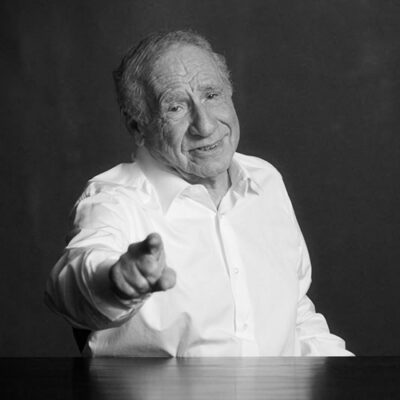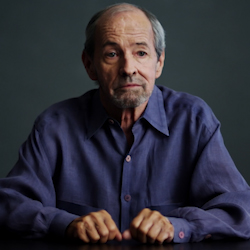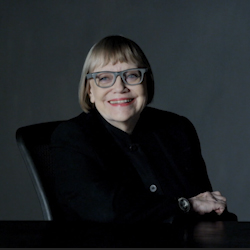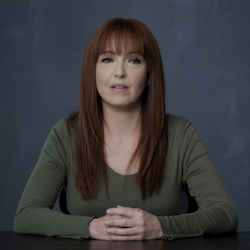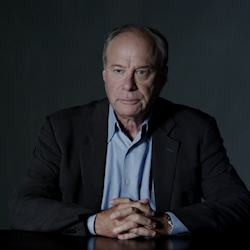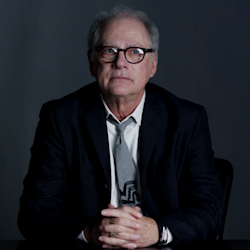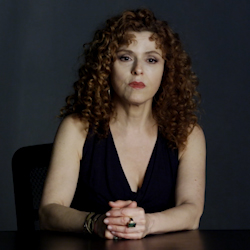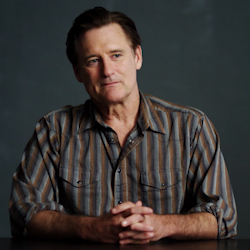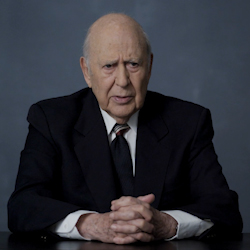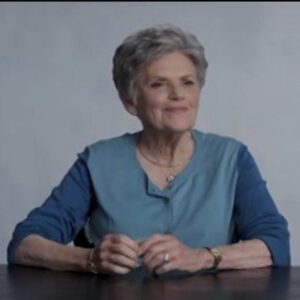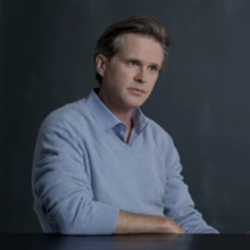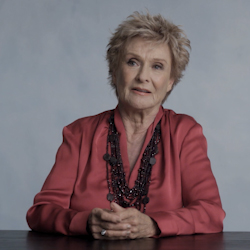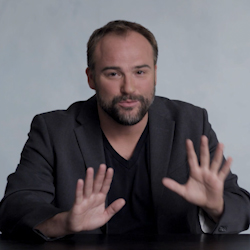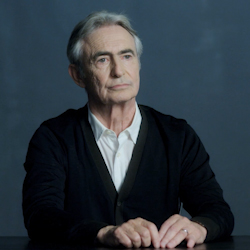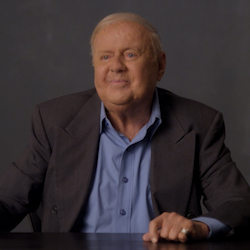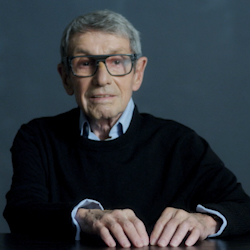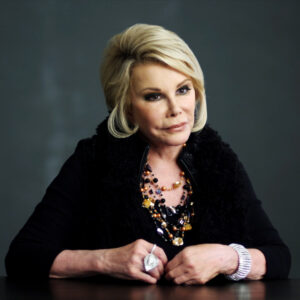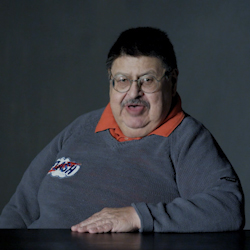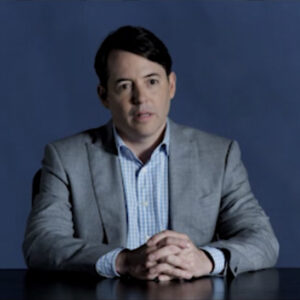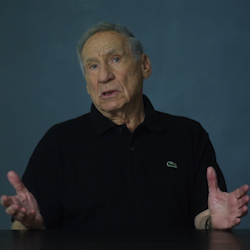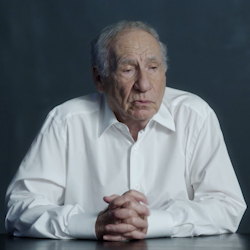Interviewer: So I’m the thing that’s good with you. Among other things, is just to place him career wise in historical context. So it’s 1974. You’re starring in the hottest show on television. And along comes. Mel. And he has the hippest movie in the country, right? I mean, do you remember when.
Rob Reiner: Sure. The producers I mean, you know, it was the hippest movie. I mean, it was you know, it’s a kind of movie. I don’t think you could get made now and certainly not with a studio. You could get it made independently, but not with the studio. It was brilliant. It was absolutely brilliant. I saw it many, many times. You know, Gene Wilder and Zero Mostel. Incredible. You know, Mel Brooks is and always has been to me, the man. And the reason I call him the man is because when I was I met him when I was four years old and my father had a house in Fire Island and they were working together on show of shows. And my dad said there’s going there was going to be this man who was gonna come visit. I told my sister and I my sister was two and he’s going to be staying over. And so I don’t want you kids coming at night, you know, late at night. You guys, when you wake up in the morning, you see this man there. Don’t get frightened because, you know, he’s a friend. So I wake up at about five o’clock in the six o’clock in the morning and I go out to the to the living room area. And this is like window seat. And there’s this man sitting, you know, lying, sleeping. And this is what Mel Brooks remembers. This is how we met. There’s me, four years old, my sister Annie, too. And I say and she says, Is Dad the man? I said, Yeah, that’s the man. That’s the man. That’s the man. Yeah, that’s the man. That’s the man. Yeah, that’s the man. And this is what he’s hearing, so his eyes and I went and opened his eyes as he opens his eyes and he sees these two little kids staring at him. And you demand. You demand. Yeah, I’m the man. Whoever the man is. So for me, he’s the man. He’ll always be the man. And when he did the producers, it was not surprising to me that it was brilliant. The.
Interviewer: And then pleasing. Again, you’re part of this revolutionary TV show, right. On the writing, the wave of that. And then he does it again with Blazing Saddles. He somebody said, I don’t know if it was David Steinberg. Somebody said he’d make key, made it hip to be so cool to be Jewish.
Rob Reiner: Well, he did. I mean, you know, I mean, starting with the 2000 year old man, you know, that was the first, you know, purely you know, I mean, there were a lot of Jewish comics. You know, that’s you know, there’s no story. It’s not like he you throw a stick, you hit thousands of Jewish comics and there’s plenty of Jewish comics. But he did make it very hip to be Jewish. I mean, Jewish humor was usually relegated to the Borscht Belt and to certain clubs and things. But when they did 2000 year old man, my father and Mel, it became the hippest thing to be Jewish, you know, and and the weird thing about it is they didn’t think anybody would like it. I mean, they were like this was for parties. This was for their friends. It was wait, they thought way too hip for the room that nobody would dig that. And Steve Allen, you know, the story was the one who said, you know, you guys got to make this into an album. They did. And it became these classic albums. And it became not only hip to be Jewish, but it became a litmus test for whether or not you knew you were going to like someone. If you knew you were going to get along with somebody, that you were going to jive with them. If they like the 2000 year old man and they could quote the two thousand or men you knew, you could be friends with them if they didn’t hear of it or they didn’t get it. There was no chance you would ever be close friends with them.
Interviewer: You know, I asked your dad because at the time your dad was doing the talking and Dyke Show Mel court couldn’t get arrested. And I said to you, Dad.
Rob Reiner: Well, he could get arressted.
Interviewer: So he could get around.
Rob Reiner: Mel could get arrested, but but not not in show business. He could get arrested for, you know, doing all kinds of things like, you know, telling Howie Morris to get out of the rowboat in Central Park and holding. He held up Harry Morris. He basically held him up and took his money. So if Howie Morris had press charges, he could have gotten arrested. I guess there was a statute of limitations on that. So maybe by that time how he wasn’t going to press charges.
Interviewer: But I said to Dad, why didn’t you give him? Why didn’t you have them write a script for the Ticket and Dyke Show? And your dad said, you know it never what? I’ll tell you why. You said it never occurred to me. And what I had asked you that was this is, you know, the thing that in my mind, this seeming to separate Mel from a lot of other comics of his generation is he’s not trafficking. He’s his concerns are completely different set of concerns from so many other of his peers. He’s not concerned with the kids, the wife, vacs wife, the mother in law. He does not traffic in that sort of story or humor as much as going off in historical and literature base.
Rob Reiner: Well, the main thing is that I don’t think Mel Brooks I mean, he’s certainly tried writing and he wrote for Sid Caesar, but basically he was writing for himself. And Sid could do what what Mel could also do. And Sid was a great sketch sketch comedian and the best there ever was Mel. I don’t think can write for four others and he writes for himself. So, I mean, the idea of Mel writing a Dick Van Dyke Show, I don’t think it would have been. I mean, Mel is an original, you know, and when you have to write for somebody else, you have to kind of contain yourself in in certain prescribed boxes that you need to talk to function in. Mel can’t do that. Mel is his own person. He’s his own voice, his unique voice. He has to do his own thing. And I think that’s what that’s why, you know, when you look at his stuff, I mean, you know, a Mel Brooks movie, I mean, you know, the producers, Blazing Saddles, Young Frankenstein, he’s a brilliant, brilliant satirist and he has a very unique take on the world. And I don’t know that he could easily you know, he did a satire of of James Bond get smart. He did a satire of, you know, show business and was with, you know, the producers. It’s, you know, satire of Westerns, Blazing Saddles, satire of monster movies as Young Frankenstein. He’s a brilliant satirist. And I don’t know that he could have fit into the mold of doing a Dick Van Dyke Show.
Interviewer: The. We should point out that the head writer on All in the Family was Mel talking, right?
Rob Reiner: Yes. At one point, Mel Tolkan came on a number of years into the run of the show, and he was one of the. Yeah. He was one of the head writers on the show. Yeah.
Interviewer: Yeah. Wait for this to pass. Have you ever heard Richard Lewis’s theory about your dad and Mel, which is that Carl drives the truck. Mel brings the explosives.
Rob Reiner: That’s a very good analogy. What my dad does is and why I think they’re successful is Mel, it works best when he’s put in a corner, when you can’t where he cannot figure out how to get himself out of that. That’s when he’s most brilliant, when he’s put on the spot. My father has a way of leading him to places that put him in places that are so uncomfortable and awkward for him that it forces him to have to figure out a crazy, funny way to get out of it. You know, every great comedy team has a great straight man and a great, funny man. The straight man is somebody who really understands his funny man sidekick. He knows where to lead. Mel and Mel, I think, is his best when he’s when he’s with my dad, although he’s great, you know, certainly on his own. And he’s great doing his films. But for my money, I could listen to 2000 year old man over and over. You know, when I was 16 years old, I’d come home from school and put on the album the 2000, you know, 2001. And I listen to it every day. I listened to it for months on end. I mean, it was like, you know, it was like going to church. It was like a religion, you know? I mean, it was absolutely. And when I when I was 16 and I wrote a joke for them, it was the greatest thrill of my life. I mean, they were doing either Hollywood Palace or The Sullivan Show, I can remember. And they what they used to do is they used to go in because that was different. You had to do six minutes. It wasn’t like the records, the records, they completely improvised. And, you know, then they could cut the best stuff on the on the on the television appearances. They had like six months. They had the dance routine it and they had to come up with specific jokes and they were suites at my dad’s den and they go over. And I remember one time wandering in and saying, I think I have an idea for a joke. And I told him this joke and they used it. And I can’t believe I mean, to me, it was like the biggest thrill of my life that my dad and Mel Brooks would use a joke that I came up with on on on. It was either The Sullivan Show or the Hollywood Palace. You remember the joke? Yeah. The joke was it was the derivation of laughter. It was, you know. I mean, excuse me. No, it with the it was it was the derivation of applause. It was the first person to to make applause. It was a guy, you know. You know, Saul was like, you know, you know, when when people used to like something, they would go, oh my God, is that good? You know, I mean, that was the you know. And so if you loved something, you could kill yourself, you know. Oh, you know, to give to you just, you know, slap yourself. That that so sore was the first guy when nobody was looking, he pulled his head out and he did that. And his fans came together and then they they modified it and they brought it down there. So that was it. And they used it. And I said, you know, that was like the greatest thrill of my life, that they would use a joke.
Interviewer: I saw that clip. Yeah. Do you have aside from that? Probably. Do you have a particular favorite piece that they do together?
Rob Reiner: I like all of the 2000 thousand all old man. I love every one I lost. I love the psychiatric convention. I love that. I mean, I love literally every piece they’ve ever done. I mean, this there’s not a there’s not a stinker in the box, you know. I mean, they they they they’re absolutely brilliant. And and I’m like one of the most fortunate people in the world to watch those two guys go at it.
Interviewer: Did you ever go to any of the tapings like the one they did at Warner Brothers?
Rob Reiner: I did. I did. I went to the last one they did for the last album, which was I guess there was a. Carl Reiner and Mel Brooks, 2000, a man in the year 2000. So I went to that one. Yeah.
Interviewer: How was it watching him work the crowd?
Rob Reiner: Oh, it’s it’s unbelievable. I mean, you know, first of all, they haven’t lost anything. They’re still to this day, they’re funny. And they’re, you know, my dad’s 90, Mels 86. And they still can do it. They still go at it. I they I was over their house. I mean, Mel basically spends every night at my dad’s house. They go he goes over there and they they have dinner, watch a movie. They made the joke. Any movie that has secure the perimeter, they watch it but they watch everything. And. And I was there one night when they got into this fight, it was like the Sunshine Boys. They got into a fight over an appearance Mel had done on that on The Tonight Show with Johnny Carson. Mel played the. It was they were arguing about which line got the biggest laugh. And my dad insisted it was his one line, Mel insisted was another. And it was Mel was the greatest wine expert of all time. And so he sat on the couch and he was blindfolded. And Johnny Carson would put a glass of thing in front of him. And Mel would tell you, he says, I can tell any wine just by. And he tasted the first one. He goes, it’s it’s a red. It’s a Bordeaux. It’s a nineteen forty eight. It goes nothing. Johnny goes, No. He says, all right. Ah, let me try it again. It’s a it’s a red it’s a it’s a cabernet. It’s a 19th. No he says no. He says all right it’s a white and that got a huge laugh and that Mel said that was the big laugh. That was the biggest lie my dad said. The next line was the biggest laugh because he tried. And Johnny Carson’s. No, it’s night that Mel tried again. He says it’s chocolates and that got a huge laugh and melted, but it didn’t get as big a laugh is the why as the white wine, he says, My dad said yes, but it’s funny. Or the man couldn’t tell a difference between us liquid in a solid and they were screaming at each other like, you know, still arguing about which line got the biggest laugh.
Interviewer: And so tell us now about they’re at this point in their lives that their relationship, what they what they do together, you know, I mean, they basically hang out almost every day.
Rob Reiner: Yeah. They’re there together virtually every night. You know, I think they obviously they’ve been best friends, you know, for. You know, 60 years or whatever, even more. And they have recently lost their spouses. And I think they they have that bond over and they have similar sensibility. And, you know, I think it’s it’s great that they have each other. You know, I think it’s really I’m I’m really happy that they have each other.
Interviewer: The. I was talking to Tracey Ullman and she was describing a pre and post Monty Python phase in comedy. Would you say in terms of of film comedy, American film comedy, there was like a pre and post Blazing Saddles period.
Rob Reiner: You know, Mel Brooks, definitely. Like I say, was an original. There was nobody like Mel Brooks before he did what he did and really there hasn’t been anybody since. You know, there have been people that have done satires. I mean, I did Spinal Tap. I mean, we’ve done the satires. But nobody who did it with the kind of audaciousness that that Mel Brooks has done it. I think he’s a complete and utter original. I don’t think, you know, anybody you can compare him to anybody. You know, I’ve I it’s weird. You know, I’ve had three. There have been three Brooks’s in my life. All of them are not their original name. They all changed. Their names were changed to Brooks, Albert Brooks, Jim Brooks and Mel Brooks. And they’re all brilliant and they’re all funny. And maybe that’s the key. Maybe you’ve got to change your name to Brooks at some point. Maybe that’s my mistake I’ve made I. I shouldn’t have. I mean, Reiner is a good name and it certainly has worked, but maybe I’d be a little bit better if I was up.
Interviewer: Brooks, did you. Did they start doing. Were you already an adult or out on your own when when they started doing that sort of family vacations where it was?
Rob Reiner: Yeah. Oh yeah. They’re what they called Yanan felt you talking about my my dad, my dad and Mel Brooks and Norman Lear and Larry Gelbart and Dom Della wees. And so they would the five those five families would go on vacations and they would rent houses in different places. And they said they called again and VLT, which is the heaven, you know, the other side. And because it was like five, you know, five men and their wives having the greatest possible time together. And one of them was in La Costa, they used to do in Lacoste and I visited them. I used to go to offer my dad’s tennis tournament, so I’d visit them a little bit there. But they had their own group of friends and they had they I think they’ll all say that was probably the most fun times they’ve ever had.
Interviewer: So it wasn’t like it wasn’t a kids?
Rob Reiner: No, it was those. It was those five couples.
Interviewer: What do you have from any period of particularly great anecdote of Mel? Mel at home or Mel at you at your house or Mel Brooks?
Rob Reiner: There’s a thousand of them. But I mean, a one time we were playing in a tennis tournament, my dad’s tennis tournament down in La Costa. And Mel was playing against Sven Davidson, who was a Davis Cup guy from from Sweden. And Mel was on the other side of the net. And at one point, Mel poached and hit and hit a volley right at Sven Davidson. And as he hit it, he goes, Take that, you neutral bastard. And with that, I thought was you know, you’d rarely see that on a tennis court where a guy will, you know, utilize his humor to win a point.
Interviewer: You know, and that’s another thing with him. He uses language in a way that a lot of other comics do not. I mean, he used it with an intent that and sort of intensity that a lot of lot of other comics, if he’s really in love with language and how he can. Well, your dad to how they can.
Rob Reiner: Mel is not afraid to go up to the line. You know, occasionally he’ll cross it. But most of the time he just goes right up to the line. He’s totally fearless. And he’ll use language, like you say, to express himself in the most colorful possible terms. And that, to me, is what makes him great. He is a brilliant person. Mel Brooks, he’s not just a great comedian. He’s a really, really, really smart guy. So he will marshal whatever references he has, whatever command of the language that he has, and put phrase things in the most interesting ways, you know?
Interviewer: It’s a remarkable career because for a lot of different reasons. But he’s. He’s had a. He had a great first act. He had a really great second act and then with the producers on Broadway. He even got a great third act. And.
Rob Reiner: Now the only question is he’s had three great acts. Are we in an American play or are we in a Shakespearean play? Because if it’s a Shakespearean play, he’s got two more acts, his five acts. So this could be, you know, it could be he could be key, you know, keep going.
Interviewer: You know, you look at some comedic directors, whether it’s like Chaplin, Keaton, the Marx Brothers, Judd Apatow or whoever, you don’t knock it out of the park. Every time there’s ups and downs, you fall in and out of critical and public favor. How do you think he insulates himself against that? Because I know he takes it hard.
Rob Reiner: Yeah, no, he does. I mean, but, you know, he’s got he’s got survival. You know, he is a he is a survivor and he has his good friends and they are supportive. My dad being one, they’re very supportive. And, you know, when you have you go through a tough time, it’s you know, your friends pick you up and you go you go again. But he he’s a survivor, you know. I mean, he you know, it’s a lot of you know, a lot of Jewish comedians there. There’s two elements. He always talks about everything based on fear. You know, and he says it in 2001. Everything’s based on fear. Mainly love is based on fear. You know, fear is a driving force, but anger is also a driving force. You put those two together, fear and anger. And that’s a great driving thing. And I don’t I think when you get down, you’re just scared. You’ll get mad. You’re frightened that you’re going to die or that people are not going to like you anymore and those two those two motivators, fear and anger are the main propulsion, I think.
Interviewer: And he really does. And he said he really rages against death. He really hates the idea of.
Rob Reiner: Who likes death, who says, hey, this is great? Nobody. We all are, you know, angry and frightened. He was you know, we we all I you know, and we’re all trying to do things to pretend that anything going to happen. But, you know, guess what? You know, I was Merza, you know, the great oddsmakers say six to five against.
Interviewer: The you know, and had to and it was in New York last year. And I was talking to Nathan Lane and this is that. Anne who told him, you know, pretty much when he writes, it’s whether it’s a screwed up version. But a lot of what he’s writing is a variant on a father son story. You have you take the producers. Sure. The father corrupts the sign. But she says she had said it’s a lot of he’s always kind of mining that father son territory or male camaraderie, because you look at the first three movies, the twelve chairs producers, young, Frank, Blazing Saddles, the guy gets the guy at the end.
Rob Reiner: Yeah.
Interviewer: If he’s male, camaraderie is a real important theme.
Rob Reiner: Clearly, I mean, look at look at him and my dad. I mean, you know that you can’t have more male camaraderie than those two guys. Yeah. Obviously, it means it means a lot to him. And he was the youngest of the children, and I think he was loved. You know, I do think he was loved in this. But I, I, you know, I’ve never had conversations with him about what his relationship with his father was like. So, you know, you’d have to ask him about that or ask his analyst if he’d let you. He wouldn’t probably. Or he charge you a lot for that.
Interviewer: And that’s the thing. He’s one of the few performers. Carol Burnett is another one that comes to mind that you say their name and people just smile. They have there’s such a affection for him. And yet you you should realize he can’t possibly want or be on all the time. So I think people get confused because there is the private now.
Rob Reiner: Yes. And I think I think for Mel and that’s why he likes being with my dad. I think he feels they’re comfortable with each other and they don’t have to be on with each other. I think Mel feels when he’s in public that he has to be on. I think that he feels people expect that of him. I notice when he’s in a restaurant, he’ll work the room. He’ll go from table to table a lot of times because he feels like that’s what is expected of him. Whether or not he enjoys it, I think he obviously enjoys it when he’s getting laughs and stuff. But I don’t think he enjoys that. He feels he has to do it. Do you know? You know, my dad is always wanting to do stuff with them and he goes kicking and screaming a lot of times to doing it because he doesn’t feel like he wants to have to do that all time once he’s there and he’s pushed into that position. Then he and he’s and he’s succeeding, which he always does. Then he’s happy that he did it. But he doesn’t like to have to do that. I think he’d like to be able to just relax and not have to do that all the time in the time you’ve known him.
Interviewer: And I realize it’s you know, you were four when it started. You know, it’s another incredible thing, because over time, you see someone’s he he remains so true to him as I’m doing my professionally now. But he remains so true to himself and that he doesn’t. It doesn’t seem like his particular viewpoint. It didn’t change when he became a father. It didn’t change when he his viewpoint just from, let’s say, from Sid’s time onward. I mean, he’s always kept right in there. But above and beyond that, even have. Have you sensed any change in him?
Rob Reiner: No. No. I mean, he he is who he is and he has that unique voice. And it’s always been there. I mean, he he’s not he’s not one of those guys that, you know, says, well, they didn’t like this. So I’ll try this now. You know, he is very confident about what he does. He knows what he does is good and he forges ahead. You know, I mean, I don’t think you could tell him to do this or do that. I mean, he’s you know, he’s got his own you know, he’s a he’s definitely walking to his own drummer there. I mean, he he’s like my friend Albert Albats is very much the same way over books. I mean, you can’t tell Albert to do this or that he got his. And that’s what makes them great. That’s what makes them unique, is that they have their own way of doing things. That’s that’s not going to change. And you don’t want it to change.
Interviewer: Is there anything I’m not thinking of that you.
Rob Reiner: Well, what you’re not thinking of is the same thing that he talked about when he talked about Freud, you know, as being a great basketball player. Not many people know that. Mel Brooks is a great drummer. And you know that probably, you know, if there hadn’t been a Gene Krupa or a Buddy Rich, you know, Mel could have carved out a name for himself in that area. But, you know, I think a lot of it had to do with his rage, you know, take something to bang, something to hit. And so, yes, he could. He could. He could paradiddle with the best of them.
Interviewer: Where do you think this rage comes from? Because it it doesn’t dissipate.
Rob Reiner: I think it comes from a number of places. I wouldn’t say that. I wouldn’t know what his you know, what his parental influence was. You start with if you’ve been chased by either Egyptians or Cossacks or Nazis for your whole life, you get pretty pissed. It’s like enough already. Enough already with the you know, with it, with the persecution. It could make you very angry. And we always looking around the corner for where’s the next Kossak or Nazi that’s gonna come and get us. And so that does it makes you frightened and it makes you angry. Fear and anger say those two things together.
Interviewer: I said to him, lots of dictators have come and gone. But he really has a soft spot for Adolf Hitler.
Rob Reiner: Yeah, well, who doesn’t have a soft spot for Adolf Hitler? Come on. Be honest.
Interviewer: Exactly. But I, I, I really threw them because I said, when was the first time you became aware of Hitler. Wow. You know, and he really thought about. But then he was going on. I mean he he has used him so much and so well it never gets old. But but some people still manage to get offended by it. But.
Rob Reiner: Well, of course, they’re going to get offended by it, because if you don’t have a sense of humor, you’re going to be offended by it. But I mean, that’s one of the ways that the Jewish people have of staying alive, is that we make fun of these things. I mean, you know, what doesn’t kill you makes you stronger if you can laugh at it. And and you know. You know. To Hitler, and, you know, we do with humor. And that’s that’s how how we do it. And Mel is the best at it. He’s the best at this to Hitler. There’s ever been.
Interviewer: What? What do you think of his? I mean, do you think that him. Him and your dad, I’ll work on anything new. Or you know.
Rob Reiner: You know, you never know. I mean, I’ve been trying to get them to to do another album. I would love for them to do. You know, one last album. But you never know. I mean, so long as they’re hanging out, you never know what’s going to happen.
Interviewer: They’re really incredible. I mean, it’s an incredible amount of energy. Last thing we’re talking about his generation of comic mind. And I think it’s important you should tell us, like your dad, like Mel talking. It comes. Tracy, you might. I shouldn’t say this because you might know some of them, but Tracey Ullman was complaining about her writer’s room book from the first series way back. And she said, you know, the day Mel came to do a guest shot because finally she finally they stopped complaining. You know, she says Mel is coming. And she said, you really realized immediately that that generation of writer, because they were first generation Americans and their parents were really steeped in culture, other cultural references that they could pass on to them. And she said, you know, I had a bunch of whiners in the room, but I think we should if you can make the point about your dad’s generation, which is Mel’s two of of writer and how educated they were for being, you know, sort of new to the country in a way.
Rob Reiner: Well, I mean, if you look at the writers that wrote for show off shows, Mel Brooks, Neil Simon, Aaron Rubin, Larry Gelbart, Joe Stein, Woody Allen, you’re talking about basically anything that you laughed at in the second half of the 20th century came out of that room. When you think of all of Woody Allen’s movies and all of Neil Simon’s plays and all of Mel Brooks’s movies and plays and all the things my dad did and Aaron Rubin and Joe Stein or a Fiddler on the Roof and Larry Gelbart wrote MASH and Tootsie and all of that. Everything that you’ve laughed at basically in the second half of the 20th century was came out of that room there. Comedy came from life. Now, you have generations removed where our comedy is coming from, things we saw on them in the media because we’ve been exposed. We were the first generation that grew up on television. So all of the things that we saw were written by people who were taking from life. They weren’t taking from the media. You know, when I my I made I’ve said this before, but my dad was on television before we owned a television. So what they were writing about was, yes, there were movie satires, but with things that they saw in life. So their satire was was only one step removed from life and from the experience of coming to America and the immigrant population coming to America every generation after that has been like it’s getting more and more faded. The carbon copies are getting more and more faded because we’re commenting on the media, that comment that on life, it’s just getting more and more removed to now that there’s these idiotic reality shows that aren’t real. You know, it’s just a strange thing. And that’s why I think that that humor was so good, because it was steeped in something that was a real life experience. And they were people who struggled, who struggled. You know, coming to America.
Interviewer: I can’t maybe you’d know offhand. I can’t think of someone. Well, not even so much Woody Allen anymore. Mel had a stock company of actors that he use it. I can’t think of a sort of modern.
Rob Reiner: Well, Chris Guest has a stock company of actors. He uses the same people over and over again. And, you know, that’s because they know how to do it. I mean, they know how to improvise. They know how to do their do their thing.
Interviewer: Right. All right. Anything else?
Rob Reiner: Twenty five dollars, please. No. That’s it. I think we.
Interviewer: All right.
Rob Reiner: All right. Thank you so much.

